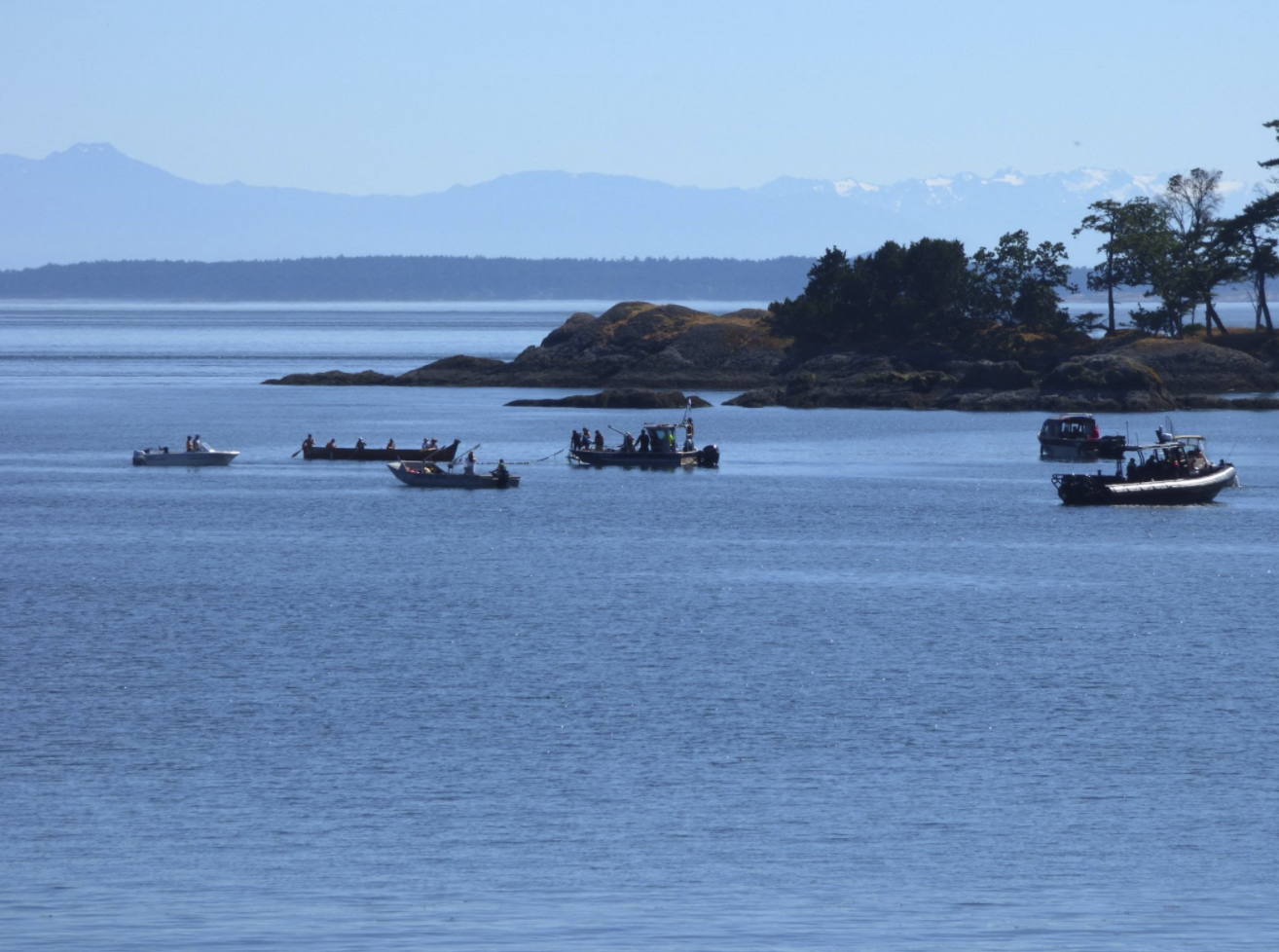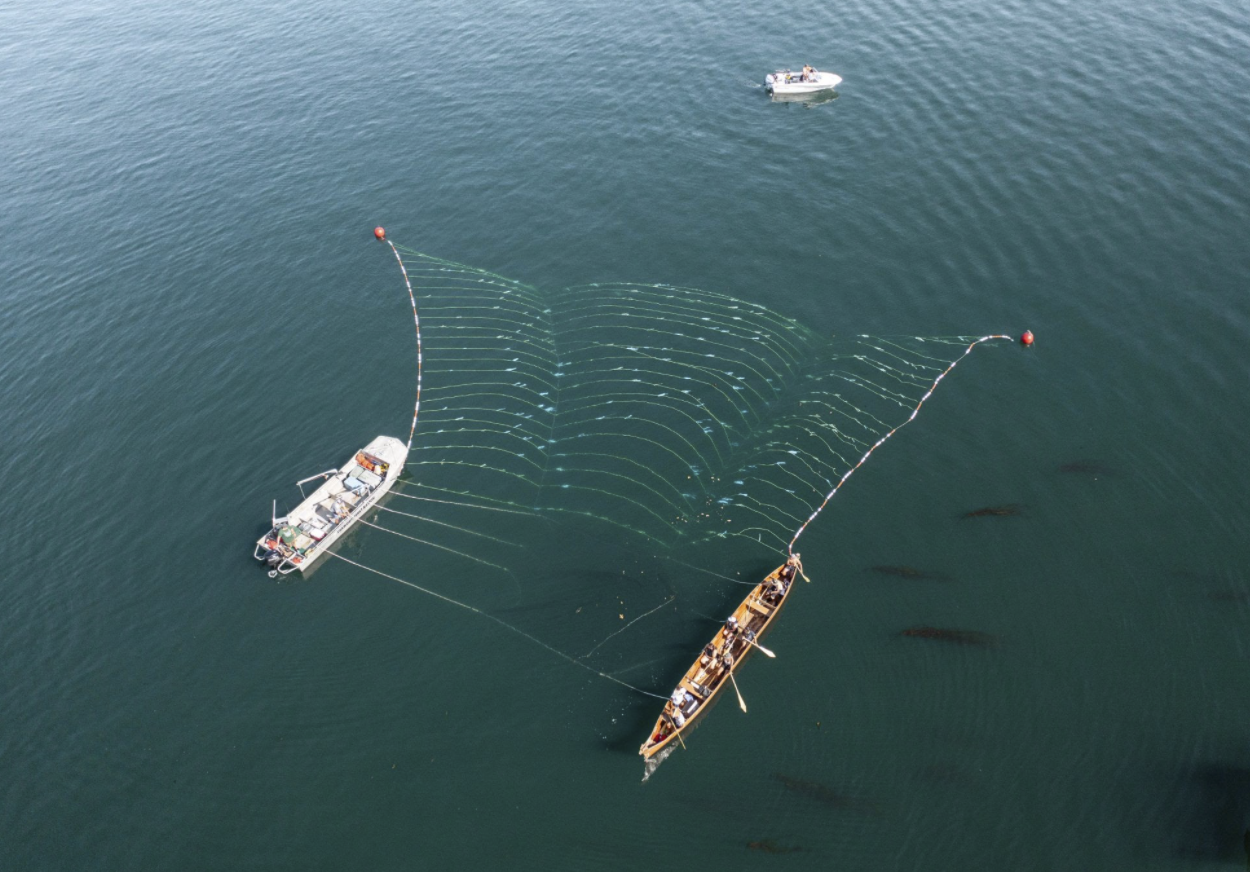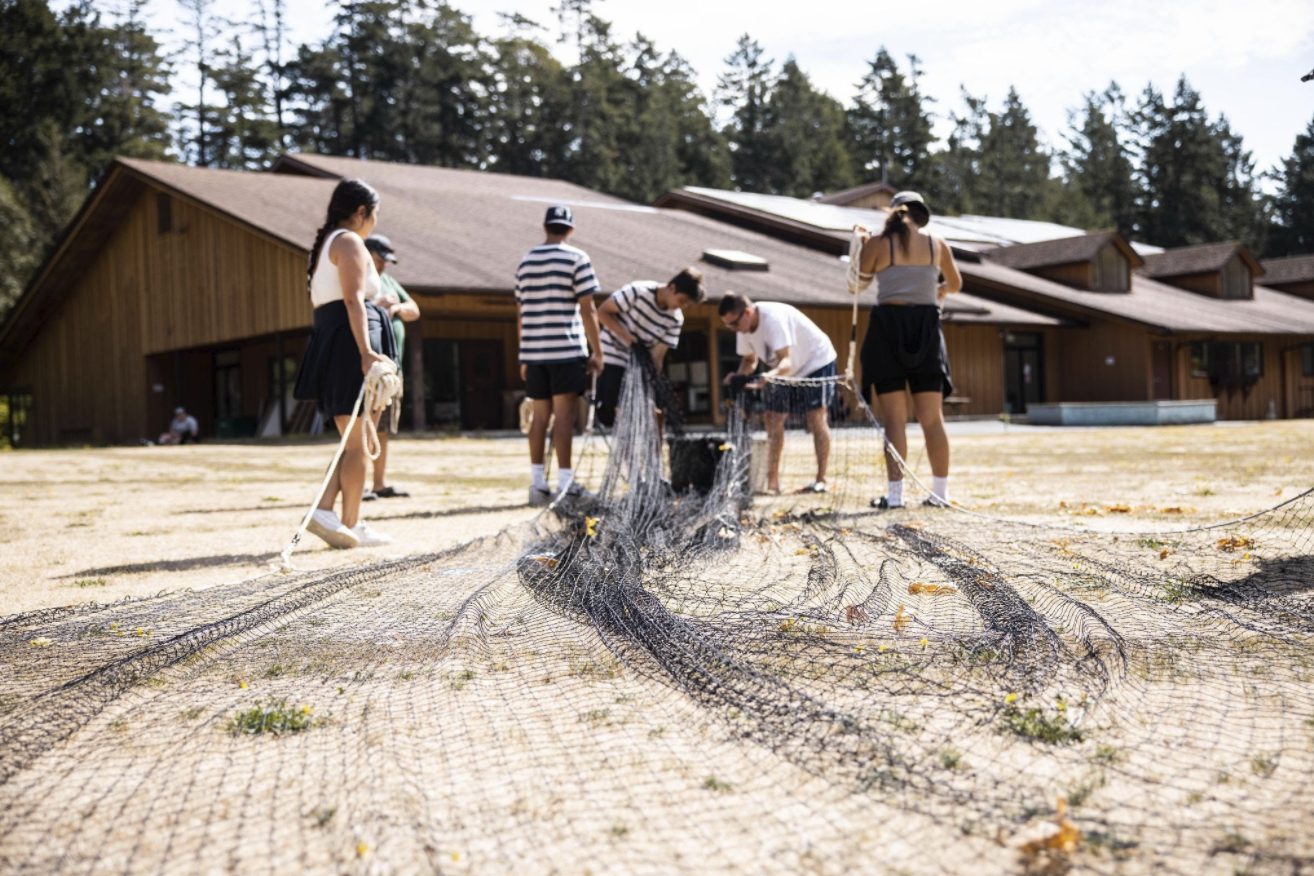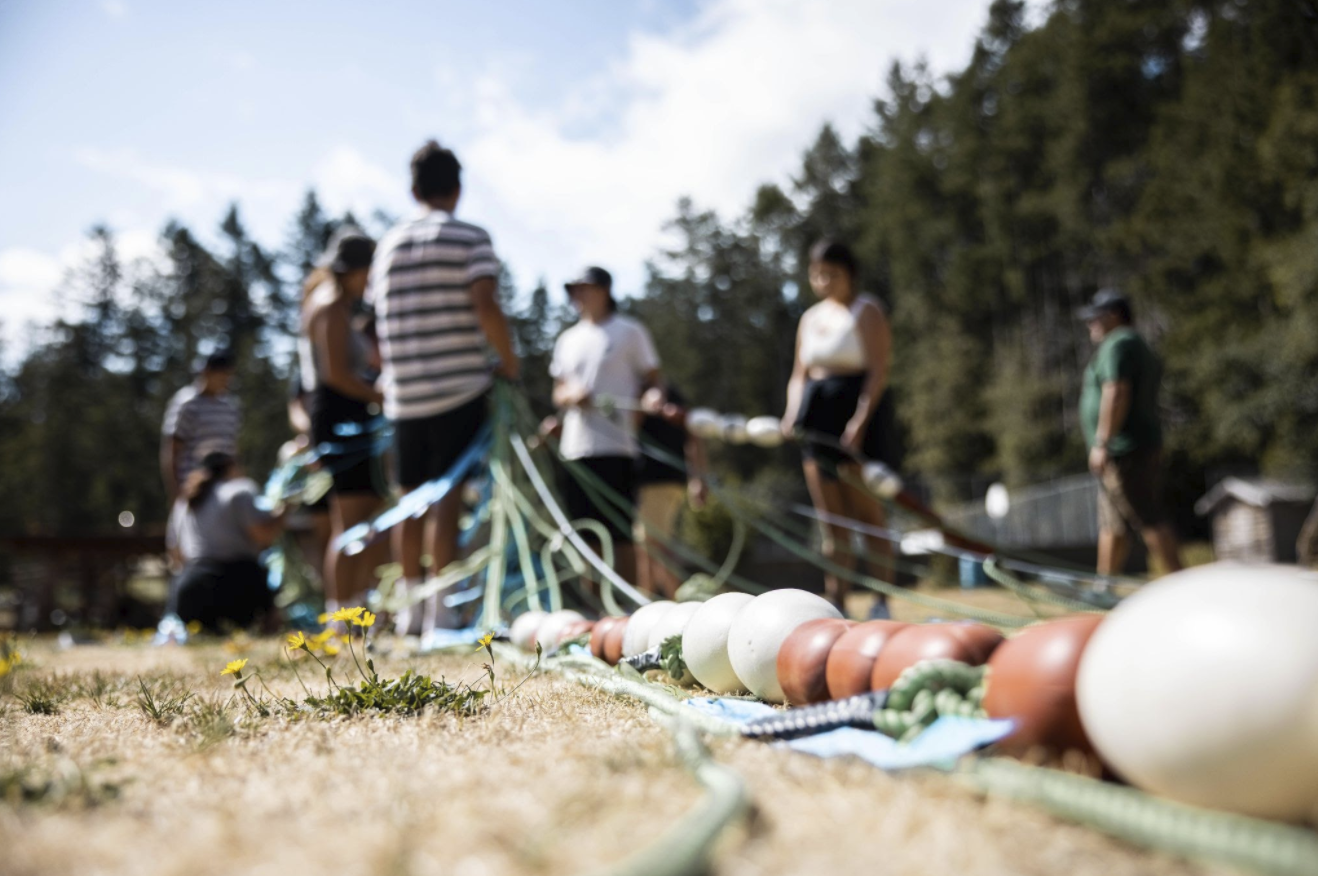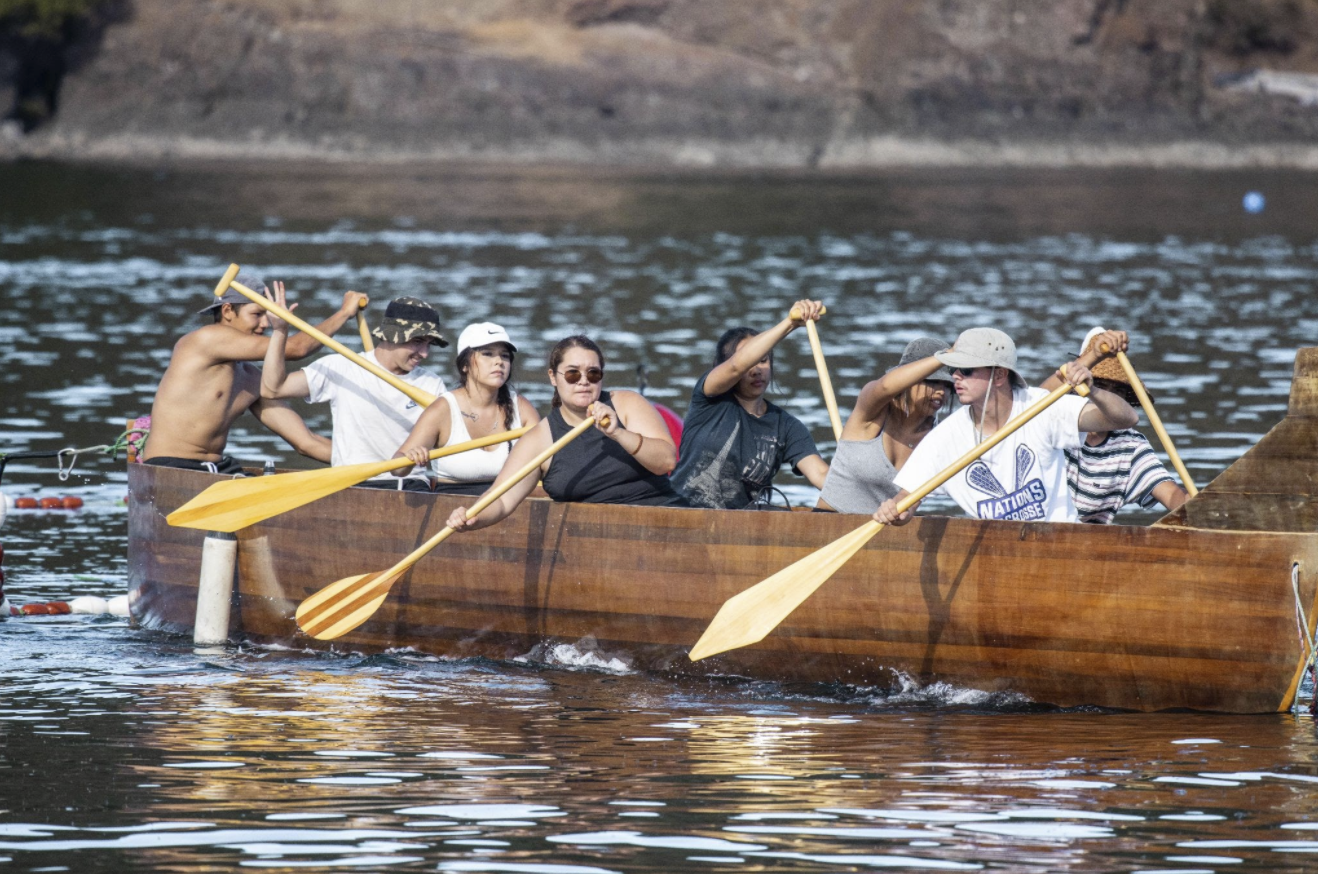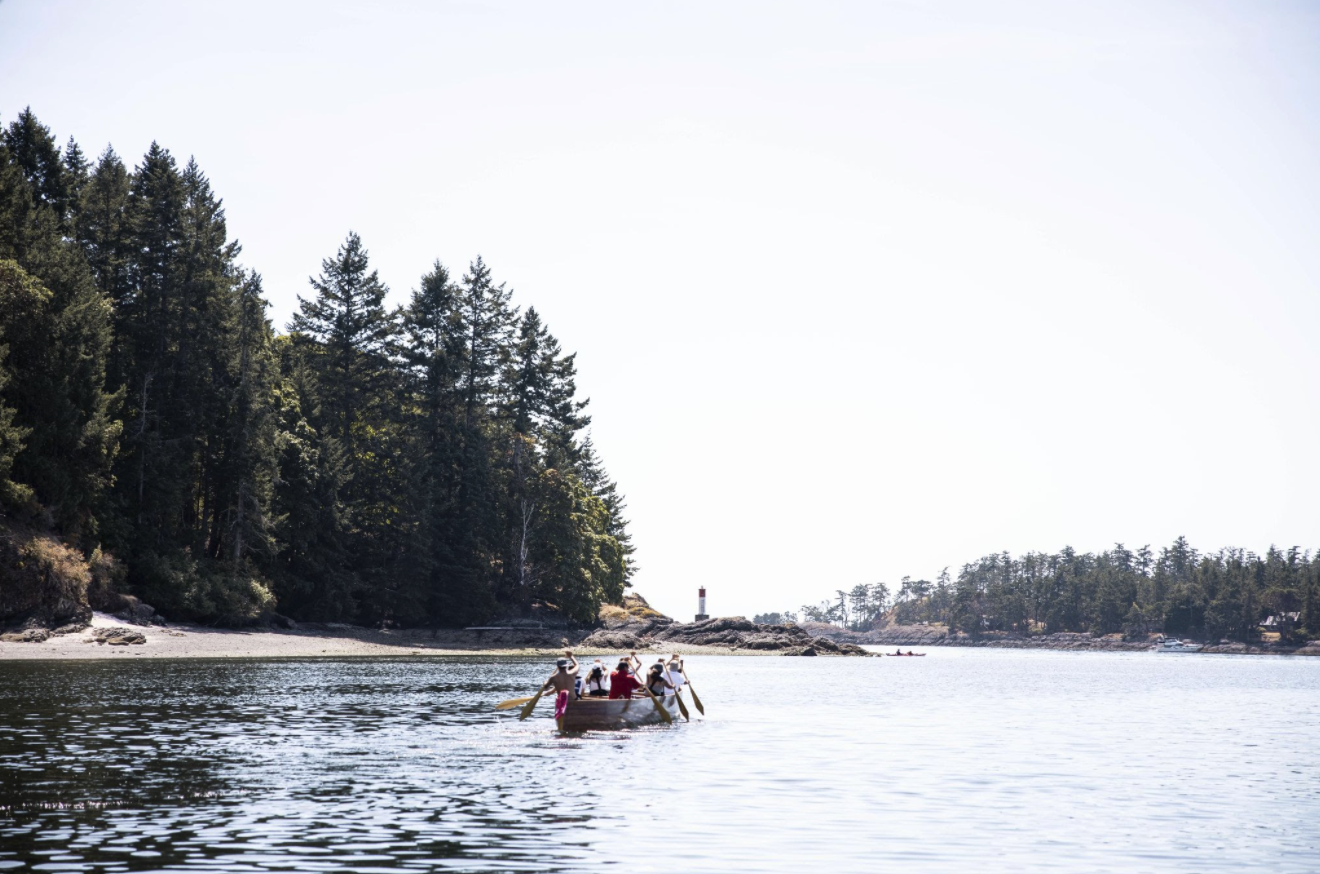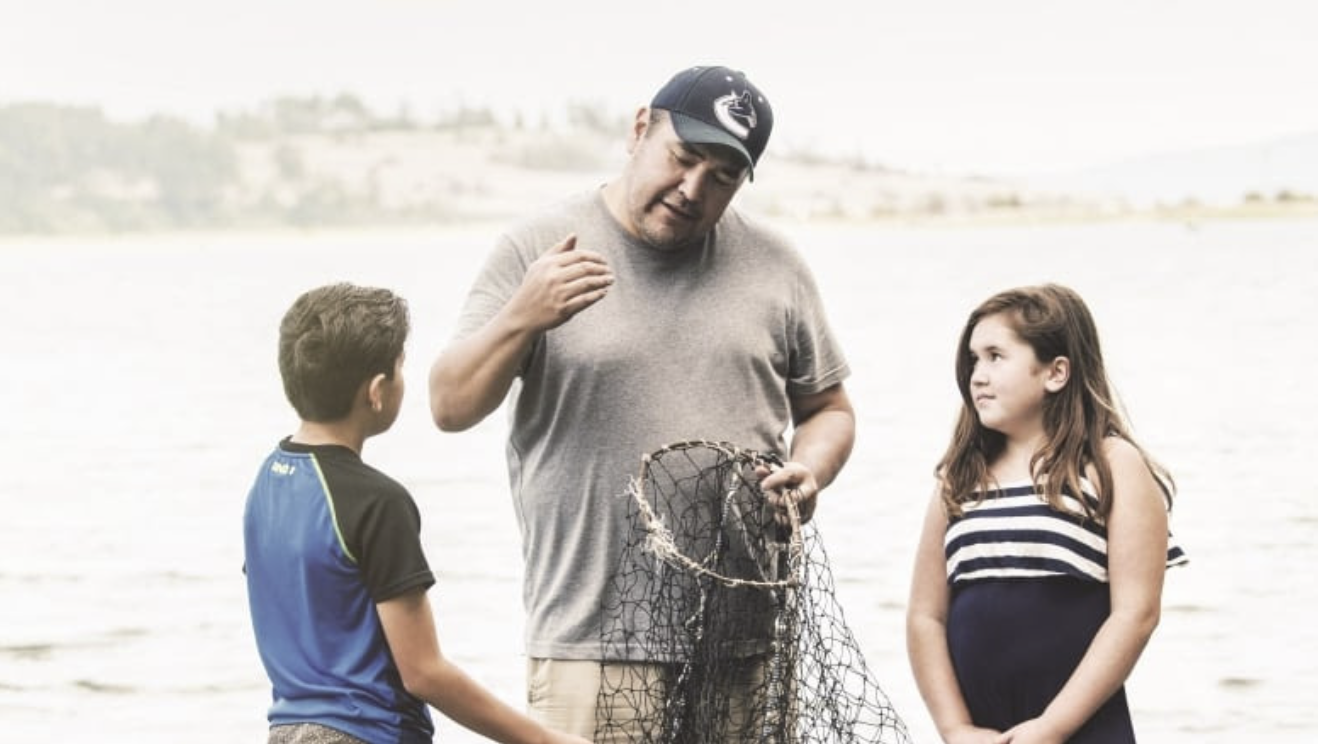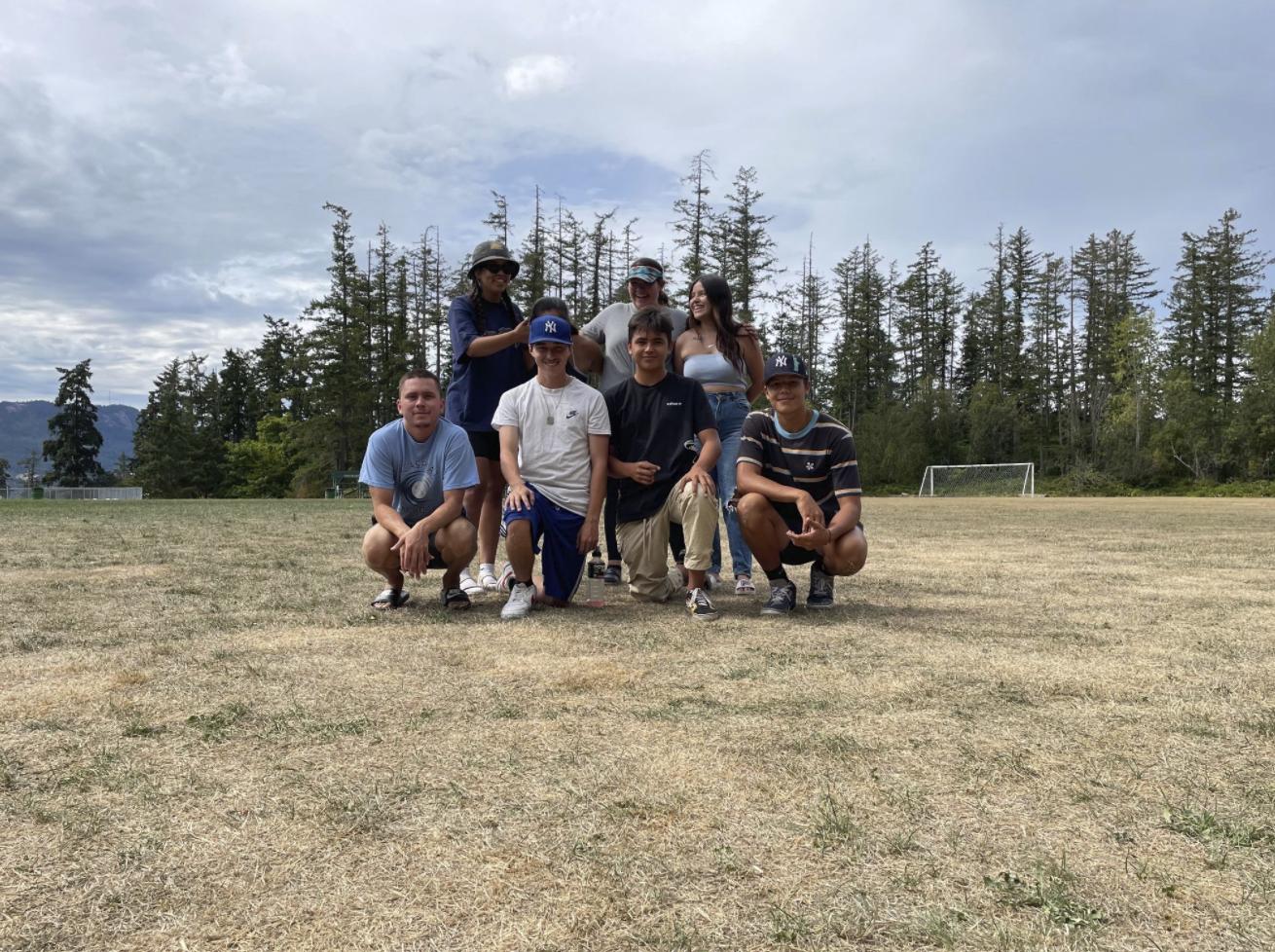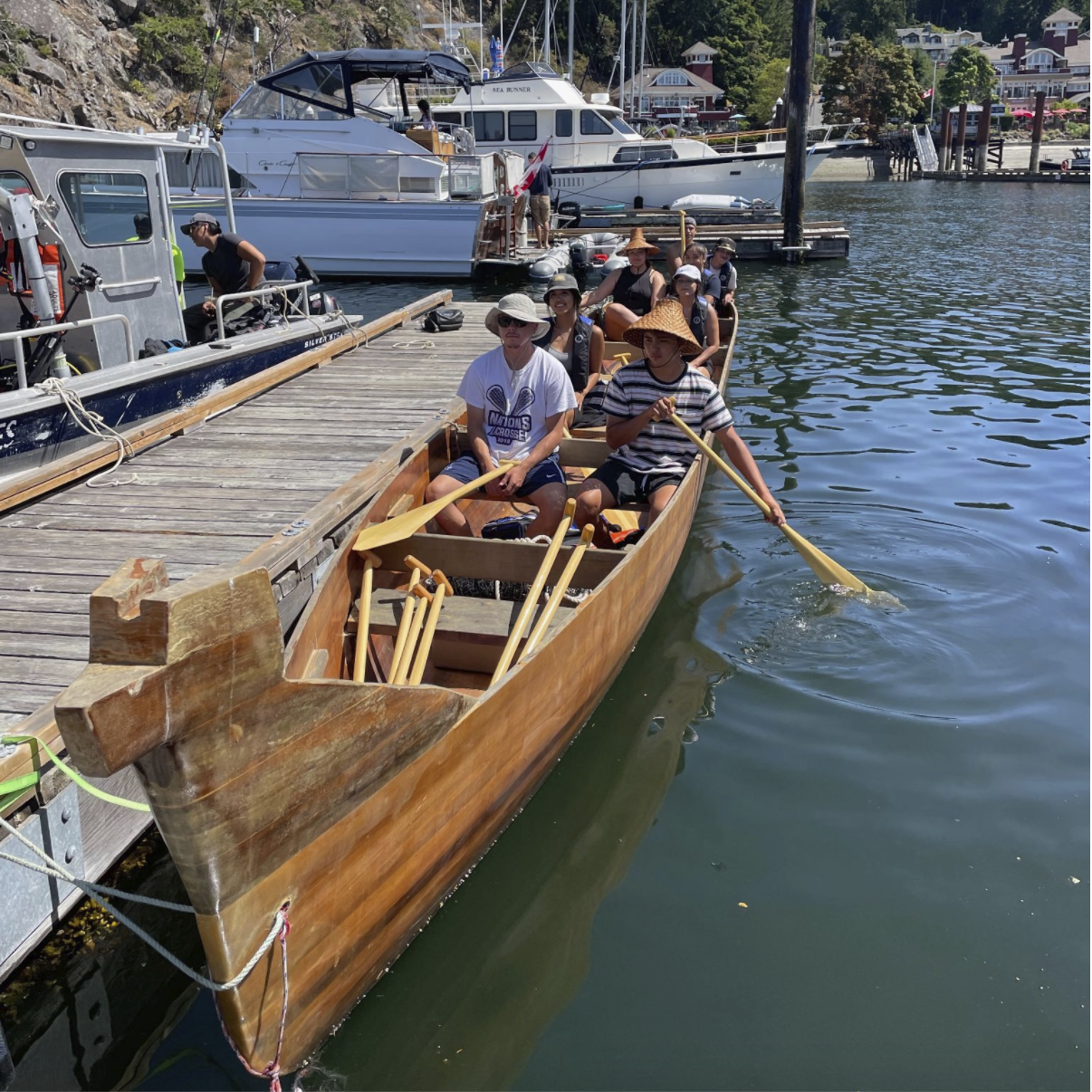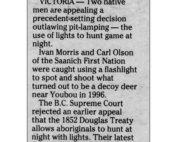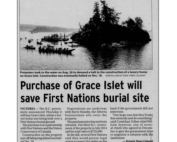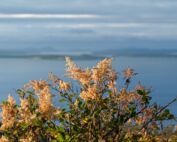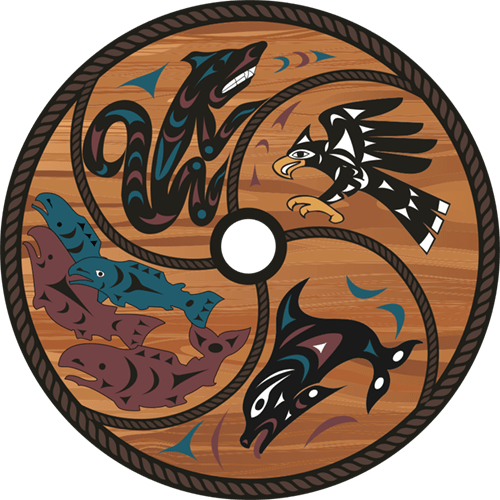For the second summer in a row, W̱SÁNEĆ Youth made and launched a historically accurate Reef Net at SX̱IX̱ŦE, a traditional reef net site.
Photo of the 2021 Youth Reef Net Project, Courtesy of Paul Michael Petrie
About the Reef Net:
The Youth Reef Net program, developed by the W̱SÁNEĆ Leadership Council, began in 2020 as a way for knowledge to be transferred from Elders to Youth, revitalize W̱SÁNEĆ culture and provide employment opportunities for members of the community.
SX̱OLE, or reef net fishing, was outlawed by the colonial government a hundred years ago. Since August 2014, the W̱SÁNEĆ Nation has been working to reclaim the distinct reef net fishing technology they share with their Lummi Nation relatives, located in Washington State.
Traditionally, the W̱SÁNEĆ reef net would be suspended between two ocean-going canoes to direct migrating salmon into the belly of the net. W̱IĆKINEM / Eric Pelkey, the Great Grandson of Chief Louie Pelkey, and WLC Community Engagement Coordinator shares:
“Many years ago the reef net was a thriving center of the economic life of our families of QENEṈ,IW̱.”
Pelkey continues,
“Our Elders told us that many years ago our family had a reefnet site located at SX̱IX̱ŦE; that was directly across the bay from what is now known as Poets Cove. Poets Cove resort is located on the village site of QENEṈ,IW̱.”
QENEṈ,IW̱ got its name from an incident that occurred around the reefnet site located at SX̱IX̱ŦE. The reefnet was to benefit all the people of the village equally – that was the law. But there came a time when a powerful SIÁWE (a visionary person who was able to read thoughts and see individuals’ futures), was using her powers for personal benefit. The SIÁWE sought to take possession of the reef net site at SX̱IX̱ŦE for her own benefit and personal wealth. She went out to the reef net site and chased the fisherman away. XÁLS (the Creator) saw what the SIÁWE was doing and came down from the heavens to the people of the village. He bade them all look at the SIÁWE out at SX̱IX̱ŦE. A loud roar came from the heavens and a bolt of lightning shot down and struck the SIÁWE and turned her to stone. XÁLS warned the people of the village “Greed is against the laws of the W̱ILNEW̱ people, in order to survive you must share the wealth, none must go hungry. You have all witnessed the consequences. From this day forward this place shall be known as QENEṈ,IW̱ (meaning something that is stopped), because of what you have witnessed!”
The 2nd annual reef net launch at SX̱IX̱ŦE
This year’s youth group was led again by acclaimed local athlete Landon Underwood. The seven youth, aged between 17-26, spent over a month this summer researching, sourcing materials and working with Elders to build a culturally accurate reef net.
Once they finished making the net, the youth then paddled out in two vessels, surrounded by cheering community members and supported by Elders. This year, the youth successfully launched their net into the strong currents of SX̱IX̱ŦE in the same way their ancestors did since time immemorial.
When asked how what her experience was like, two-time Youth Reef Net Project participant Laila Morris was delighted at the progress made from one year to the next:
“Considering how much I enjoyed being a part of the Reef Net project in the summer of 2020, I had pretty high hopes coming into this summer. We started the summer off by taking the time to learn to take better care of our lead net because last year’s main focus was the actual foundation and building of the lead net. I believe that the time we took, in the beginning, practicing with the lead net definitely paid off in the end because during our Pender trip we actually were able to set out both nets in the water successfully! Although we didn’t catch any fish this year I’m so glad we were able to redeem ourselves, in a way, by successfully setting our SX̱OLE. I believe this program is the perfect way to take back reef net fishing and bring it back to our communities through the youth.”
Other youth attendees share Laila’s sentiment.
Troy Macleod, a new participant this year shared
“I enjoyed working with everyone and having them teach me how to use and set up the reef net in the water. I liked that I got to work with relatives from the community and have this program bring us together for one big project that taught us the way our culture used to do it back in the day. The fact we actually got it out correctly on the water compared to last year is awesome.”
Another new participant, Patrick Elliott agrees,
“This summer I applied for my first year to be a part of the W̱SÁNEĆ Reef Net program. We started the summer working with the Reef Net while also getting to know each other. The net brought us all together to do some amazing things. We set the Reef Net just off of Pender island and it was a huge success, we got the Net in the water for at least 2 hours. We learned a lot more about the lead this year & I’m looking forward to hopefully being a part of this amazing group again.”
Similarly, Edna Ellsworth shares,
“In this year’s Reef Net Program we were able to become more knowledgeable about how to take care of the lead and how to assemble a net. With this knowledge, we were more successful at setting the lead and the net out on Pender this year. In addition, we spent much time making our own net and working as a team. It was good to have our own final product and it was great to have some success when we were setting the net.”
When we asked Underwood what he’d like the community to know about this year’s Reef Net project, he replied:
“It would be good for people to know that we are heading in the right direction by revitalizing this technology that was outlawed by the government. Last year we made the net and had problems with it being tangled, this year we had no problems getting it out and hopefully next year we will catch some fish.”
Nick Claxton, a W̱SÁNEĆ Elder, and UVic Indigenous Education advisor who completed his PhD dissertation on the Reef Net, has been a resource for the youth since the project’s inception.
Widely considered an expert on Reef Net technology, Claxton shares
“It’s something that has been part of my learning journey, the significance of it culturally and spiritually and to contribute to the resurgence of the Reef Net, technically.
Nick Claxton, image courtesy of CBC.ca
About the project, Claxton shares:
“This project has warmed my heart particularly because it’s youth-led. It’s inspiring! The Youth are looking forward. They are hungry for the knowledge and the culture. They’re regaining it, bringing it back and learning it themselves. Just acknowledging that although I’ve tried to be a resource, it’s been on their initiative. It gives me hope for the future.”
Claxton continues,
“And this is just a beginning, they’ve done it for two summers and it will be part of a long journey back to where our creator wants us to be in relation to the salmon, the language and the sea. All the things that were disrupted and taken away over the last 100 or so years. The creator gave us these gifts to nurture and take care of, it’s part of our responsibility.
A lot of people might question the success of the project, looking at it in terms of Did you catch fish – but the youth, they’ve learned and they’ve continued to learn, gain knowledge and experience, and they’re getting better every year. There’s a lot of learning to go – including learning the tides. For everyone, we are all relearning how to be reef net fishermen.As humans, we are faced with so many things, climate change, salmon population decline, climate degradation. The world is looking for more sustainable ways to live. The reef net technology, as with other indigenous technology could be valuable for finding more sustainable ways for everyone to live moving forward.”
Gord Elliott, W̱SÁNEĆ Leadership Council’s Director of Operations commented,
“The W̱SÁNEĆ Youth are becoming the leaders in SX̱OLE Revitalization. I had the honour of assisting in setting the net, and I was incredibly proud of the youth’s comfort in handling the Reef Net. It is no easy task and takes an incredible amount of effort, coordination and teamwork to launch the net and lead. It is comforting and relieving to witness successful knowledge transfer in action.”


